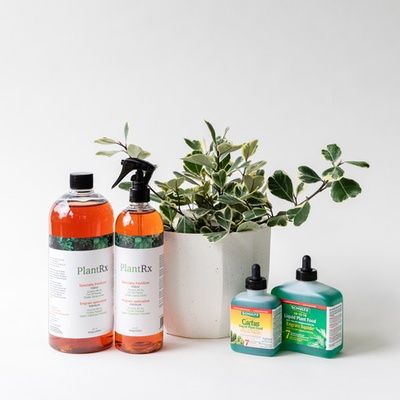What You Need To Know About Fertilizer

Image by @laurenkolyn_studio
We liken fertilizer to that supplement or multivitamin you take and realize how much better you feel. You have a bit more vitality and energy to go about your day. Sure, you may have been fine without it, but the goal is to be better than fine, isn’t it? Houseplants are the same way; if you provide them with suitable light and water, they’ll likely survive, but most won’t thrive without a little extra help.
So what do we need to understand about fertilizer? There are so many different kinds and when you read the instructions, it may be a little intimidating. We’re here to break it down for you.
Understanding Nutrients
When you read the packaging of some liquid or granular fertilizers you will see a ratio of the concentrated nutrients. They are typically represented in their elements: Nitrogen, Phosphorus, and Potassium. A lovely instructor at school unforgettably described their efficacy in this way-up, down, and all around.
Up: Nitrogen affects vegetative growth. It’s the macronutrient that helps your plant become lush, green and promotes new shoots. Nitrogen-heavy fertilizers are commonly found in lawn care. It’s usually pretty balanced for houseplants.
Down: Phosphorus promotes healthy root development and is the nutrient that boosts flower and fruit production. Any fertilizer that you see with a higher ratio of phosphorus is likely to help flowering plants.
All-around: Potassium just improves the overall health of the plant. It aids in disease prevention and augmenting your plant’s hardiness. Your plant will be stronger because of potassium.
We understand that nitrogen, phosphorus, and potassium are macronutrients and your plant will need them in larger quantities. But, that is not all! Plants also require micronutrients, and by that, we mean iron, calcium, zinc etc. These micronutrients are usually found in the soil, through the organic material found in its composition.
This brings us to indoor plant’s soil health. Plants in nature benefit from all of the decomposing matter around them. Nutrient cycling refers to all of the decomposing animals, leaves, insects, and other organic material broken down by microorganisms. This process benefits the surrounding plants and trees by making these trace nutrients available for their growth and overall health. This process is not happening to the soil in your condo, which has a finite amount of nutrients, depleted by your growing Monstera.
So we help this process along by repotting our plants every 1-2 years and adding fresh nutrients throughout the year. One of the soil amendments we often recommend is worm castings, which is essentially worm manure. It is nutrient-rich and odourless and horticulturalists refer to it as “Black Gold.” Your plant will have access to all of the trace nutrients it needs to thrive. Worm castings also improve the soil structure, but we’ll leave that for a different blog post.
Not Every Plant Needs the Same Food
This is just a friendly reminder that it does not hurt to do a little research about what fertilizer your plant requires. Some plants are very heavy feeders and enjoy nutrient-rich soil, while others prefer far fewer nutrients to be happy. Most cacti and succulents fall into this category and do not want a high concentration of nutrients. They often don’t need it. And most carnivorous plants, like Venus Fly Traps and Pitcher plants? They prefer really crappy, nutrient-deficient soil!
It’s helpful to ask friends and other members in the plant community about the fertilizers they use. You can gain more practical knowledge of what works and what to avoid for certain plant species. There are a number of fertilizer options available to you, many of which we have available at the shop! You can always check out our highlight reel for Plant Care items that will help your green companions bloom and grow! We’re here to help if you have any questions!